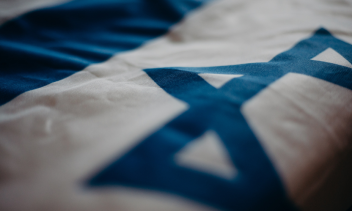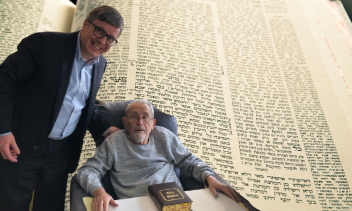Once those we love are gone, can we ever encounter them again? The question may appear to nod toward witchcraft like a seance, but that need not be the case.
In his book Time Travel: A History, historian of science James Gleick talks about memory as the ultimate time travel machine, allowing us to walk through our past to encounter our past. In our series on loss, we spoke with Josh and Dani about keeping the memories of their wife and father, respectively, alive, even if they are no longer here. In the spirit of Gleick’s book, we posed that question to our guests.
David Bashevkin:
And I’m curious, when you reflect on your father in loss, what are the moments that you most often travel back to?
Dani Ritholtz:
Great question. There are a few. I think it’s a mix of good moments and bad moments. The first moments that I usually think of summer before my bar mitzvah, which I actually talk about in the book, but the summer before my bar mitzvah, I was at home and I was golfing with my dad a lot, and we were also learning Mishnah Berurah, the halakhot of nesiat kapayim [priestly blessing] … so I was the only one home, both my sisters were in camp, and it was just, we were spending the most time probably we’ve ever spent together, where – mornings we’d daven. We would learn then the halakhot, the rules of the priestly blessing, and then we’d golf and just hang out the rest of the day. He was working at home a little bit, he was a commodities trainer, but it was really this really happy and meaningful time, because besides just the fun of playing golf and being able to hang out together, but also him in part, he was the one who suggested that we should about the halakhot of nesiat kapayim because it was something… duchening, or nesiat kapayim, was something that he loved. It was probably his favorite mitzva, and he really wanted to impart that onto me before I was going to start. In our family, not everyone has this custom… It’s only when you’re 13, that’s when you could start.
The memories of our relationships are not only painted with blissful colors. Instead, when people leave our lives, our minds may charge toward the grim parts of the past: the times we fought, failed, shouted. Guilt can be the feeling that pops into a time travel, and it can cloud a more whole, honest view of our role in their lives. Life is a portrait of many different colors, beautiful and ugly. That’s what makes it real.
David Bashevkin:
So when you think about memory and where you go, I’m curious what role the difficult times play. Meaning, the difficult times, and I mean that in two ways. Number one, before your father was sick, fights that you may have had. Every child has memories where they’re not getting along with somebody, and a lot of times, loss, what it can do to you is the pain, the deepest pain is the guilt of things unsaid, unresolved. And I know for myself, thank God I never experienced the loss of a parent, but the first loss I ever had was my bubbie, and I remember, and I was a little… I was teeny tiny. I was in fourth grade. And I remember the reaction and the loss and the tears. A lot of it was because she wasn’t favored. We didn’t have that, I was closer with my grandmother, and I felt like that sense of guilt of a relationship unresolved, which every relationship ultimately is. And on the flip side, and I mean, where you go, the memory, not just the difficult times of interpersonal stuff, but also, he was sick at the end of his life. Where does that play? Where do those moments play when you go into your time machine? Is that like, you only go to moments of joy and sweetness, or do you ever travel to maybe darker periods?
Dani Ritholtz:
I definitely travel to darker periods. That might just be myself, because I’m trying to think about all parts of the relationship. And I put that in the book, actually, a few fights that we had, and I think that I had a really very special relationship with my dad. But I knew that there’s something disingenuous if you’re just putting the positive things. I had someone who really helped me so much with the book, Rav J. J. Schacter…We talked about that, because I was wondering, even though I do it myself, because maybe trying to understand all facets of the relationship and trying to find meaning in even those dark times, I was saying, “Is this for public consumption? Is it almost lashon hora about them, about my dad?” Rav Schacter told me, no, you’re trying to show a real person here. You’re trying to show a real relationship. And if it’s all flowers and meadows and everything like that then there’s no meaning there. So I do that also I think for myself. So I really like that idea and I think that’s really what I try to do even when I think about some of the fights we had, some of the unresolved issues, because it’s a way to see that this wasn’t just a… it’s a genuine relationship that has the positives and the negatives. So that’s something that I really do go back to.
While sifting through our memory files may be meaningful for some in connecting with those they lost, others opt to preserve their flame through other means. In the context of a family, that goal takes on newfound difficulty. You are no longer working within your own mind; you are working with a tapestry of minds.
David Bashevkin:
How do you remind yourself of the personal loss? You have a family, you have kids who may not even remember in that very stark way growing up when Dannie was here, and I’m wondering how you remind yourself, are there moments, are there rituals that you have to preserve the memory of the loss? And secondly, and I’m putting this in a separate category deliberately because I want to hear if they’re different, is there a way that you preserve her memory? Those times that you had together? I don’t know how you do that, through videos or rituals or whatever it is, what are the ways that a family preserves the idea of somebody that’s no longer with them?
Josh Grajower:
So, I don’t know that they’re that different. Again, as I was saying, the loss is really the loss of the relationship, my relationship with Dannie, but a lot of my kid’s relationship with Dannie and what they’re missing out and the steps that they go through and those pieces. So I would say I don’t need reminders about it. Especially with my kids, I feel terrible for them that they don’t have her in their life, and I feel terrible for Dannie that she doesn’t get to see the way that they’re growing up and developing. And I know that that’s something that she shared with me was really hard for to not be able to see the kids as they get older. I don’t think I need reminders about that. It’s a pretty constant reminder. But again, the main way to try and preserve it and to have it be part of their lives is to talk about what she was like, how she would respond in certain circumstances, what were the things that she liked, what was her attitude towards things. I really try and talk to my kids a lot about those things.
They called her Mama. So I would say things like, Mama would have loved that song, or Mama would have done this in this time, or Mama really liked that food, or Mama would love to have seen you play that basketball game and the way that you pass the ball. There’s a million and one examples of ways that we do keep her alive, and again, keeping her alive in the sense of embodying, for my kids to embody, and to really have her influence, even if she’s not here to have her influence of her personality onto their existence.
Sometimes the legacy left behind—the lessons and influence a person brought into their world—are how you keep them alive. If one finds footprints on the beach, they may not be with the person who left those markings behind, but they can be with them through their impact. For Josh and his family, trying to “really have her influence” is how Dannie remains a force in her family’s life. Her love and her guidance are her footprints, and they are for her family to follow.
In some sense, perhaps this makes the time travel of memory operate in reverse. The past meets our present, guiding the deceased’s loved ones into the future.








